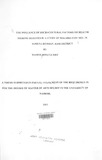| dc.description.abstract | In Kenya, and specifically Kisii district, malaria is a major health and socio-economic problem as it accounts for over 40% of all morbidity and mortality cases. Hence to improve the quality of life in this area, there is need to reduce the incidences and prevalence of this disease. Against this background, this study examined the influence of socio-cultural factors on health seeking behaviour with respect to malaria control in Sameta division, Kisii district, Kenya. The study posited that people's culture, knowledge and attitude towards malaria as well as individual socio-cultural factors influence people's treatment and prevention of malaria.
The quantitative data used in this study were collected through an interview schedule with 119 heads of households with self-reporting cases of malaria .The respondents were randomly selected through a multi-stage sampling technique. Augmentative qualitative data were also obtained through informal interviews with some of the respondents and direct observation. The quantitative data were analyzed using SPSS computer package while qualitative data were transcribed and analyzed manually.
The study findings revealed that etiological beliefs on malaria, which did not implicate the mosquito, had negative effects on malaria control. The study also found that local people had fair knowledge of existing modem malaria control technologies. However, there was inconsistent and low use mainly due to financial limitations, unavailability and inaccessibility of these technologies.
The study also found that local people believed in the efficacy of indigenous herbs and used them. Other findings showed that the choice of malaria therapy was influenced by individual attributes like age, gender and level of formal education.
This study therefore recommends the need for increased provision of health education for those with limited understanding of malaria. There is also need to harmonize the use of modern and traditional technologies in the prevention and treatment of malaria by improving their accessibility, availability and cost-effectiveness. In addition, the implementation and execution of malaria control programmes should incorporate individual attributes of the beneficiaries. | en |

